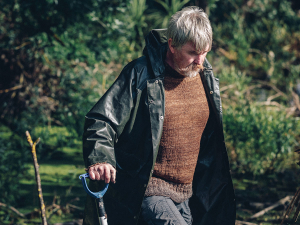Subsidies keeping wind, solar generation viable
OPINION: I recently wrote an open letter to the Prime Minister because at a recent Federated Farmers meeting, Chris Luxon told me wind and solar generation is not subsidised.
 Simon Waghorn working on the waterway restoration of the Opaoa Loop, neighbouring their home vineyard, The Farm.
Simon Waghorn working on the waterway restoration of the Opaoa Loop, neighbouring their home vineyard, The Farm.
Astrolabe walks the talk when it comes to authentic and sustainable wines, including Tōitu Carbon Zero certification, organic regenerative practices on its grower blocks, BioGro certification at the family's home vineyard, and a river restoration project with neighbouring winegrowers.
They're less keen to talk that walk, admits winemaker Arabella Waghorn, daughter of Astrolabe founders Simon Waghorn and Jane Forrest Waghorn, preferring to do rather than discuss their sustainability measures. "We know there are people doing regen way better than us, there are people doing organics way better than us, there are people doing carbon zero better than us." She's also reluctant to cheer the carbon story until the certification accounts for upstream and downstream emissions, from growers to shipping. "End to end product certification is what I really want."
Arabella and her sister Libby Levett bought into their parents' company in 2018, and by the next year had taken Jane's carbon reduction initiatives and run with them. "It feels like the most important issue of our time," Arabella says. "And it's really important to us." The footprint of growing, fermenting, packaging and shipping wine means the industry needs to focus on reducing and offsetting emissions, while also delving into the potential to maximise carbon capture through vines, soils and plantings, she says.
The Covid-19 pandemic landed soon after they set their carbon neutral goal, which proved perfect timing, because difficult conversations around cutting international flights weren't necessary with the whole country grounded. In the years since they have had to consider it more, knowing that on one hand visiting markets can be vital for small family companies with lean budgets. On the other, they're costly for carbon and cash, and she has come across customers, "especially younger ones", uneasy to see companies fly across the world for a tradeshow.
They also introduced electric vehicles, reduced waste, lightweighted glass, cut back tractor use, and trialled an electric bike in the vineyard. Some of the changes were tiny, akin to adjustments you'd make around your home to be more efficient, she says. "I don't want to be out there claiming we're changing the world, but those small things are what we all need to do." WineWorks, which is also certified carbon neutral with Toitū, bottles and stores the wines, and the Waghorns are increasingly working with suppliers that are certified or seeking certification. They offset the emissions they can't kick by buying carbon credits.
Astrolabe partners with 10 grower families, each with different soils, meso climates and management techniques, "based on their own personal philosophy", including regenerative viticulture, biodynamics and organics, as well as herbicide free sites. They all live on their vineyards, and many have native planting programmes on their property.
At their home vineyard, The Farm, the Waghorn family is working on the restoration of the Opaoa Loop with neighbours Jules Taylor and Stephen Dempster, viticulturist for both Astrolable and Jules Taylor Wines. That's meant ridding the waterway of willows and other pest trees, then planting along the edge, while also running pest trapping programmes. Stephen says the previous owners of his vineyard started planted the likes of kahikatea and tōtara 20 years ago. Now, with the clearing, planting and trapping, they’re seeing kahikatea growing from seed dropped by established trees, he says, excited to watch the change in tree and bird life. Jane’s next plan is to plant a micro-forest, linking the creek site to The Farm.
The myriad projects all take time, money and passion, and in some cases they’re “fumbling through”, says Arabella – “trying to do our best.” And the main focus, of course, is the wine. “We are trying to make the best quality wine we can, because if you are not making something you really stand behind, it’s all a waste of carbon.”
Jimmy Stewart is quite literally chipping away at circularity.
A Wine Marlborough Lifetime Achievement Award is “very premature”, say Kevin and Kimberley Judd, nearly 43 years after they came…
Wine tourism has evolved into a sophisticated, diverse and resilient part of the New Zealand wine sector's economy. Emma Jenkins MW talks…